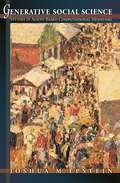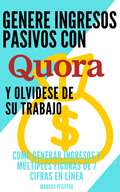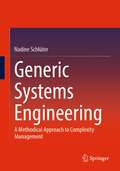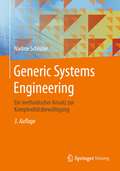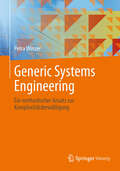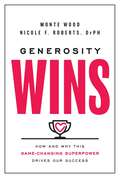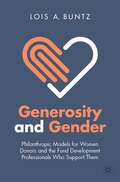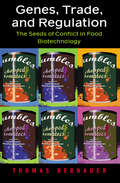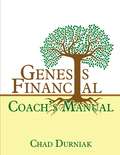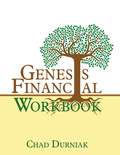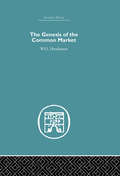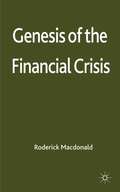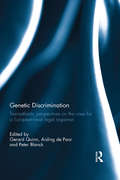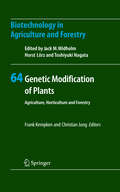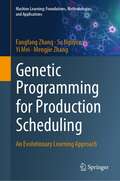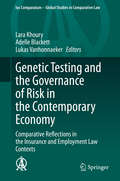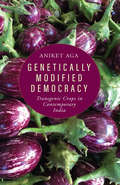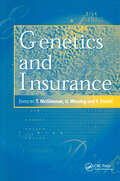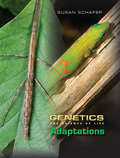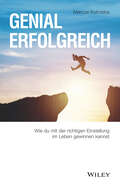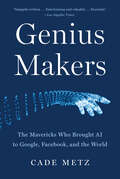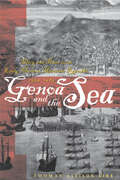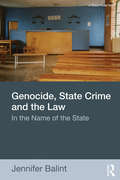- Table View
- List View
Generative Social Science: Studies in Agent-Based Computational Modeling (Princeton Studies in Complexity #21)
by Joshua M. EpsteinAgent-based computational modeling is changing the face of social science. In Generative Social Science, Joshua Epstein argues that this powerful, novel technique permits the social sciences to meet a fundamentally new standard of explanation, in which one "grows" the phenomenon of interest in an artificial society of interacting agents: heterogeneous, boundedly rational actors, represented as mathematical or software objects. After elaborating this notion of generative explanation in a pair of overarching foundational chapters, Epstein illustrates it with examples chosen from such far-flung fields as archaeology, civil conflict, the evolution of norms, epidemiology, retirement economics, spatial games, and organizational adaptation. In elegant chapter preludes, he explains how these widely diverse modeling studies support his sweeping case for generative explanation.This book represents a powerful consolidation of Epstein's interdisciplinary research activities in the decade since the publication of his and Robert Axtell's landmark volume, Growing Artificial Societies. Beautifully illustrated, Generative Social Science includes a CD that contains animated movies of core model runs, and programs allowing users to easily change assumptions and explore models, making it an invaluable text for courses in modeling at all levels.
Genere ingresos pasivos con quora: Y olvidese de su trabajo
by Marcus PfeifferEste libro trata sobre cómo ganar dinero bajo un sistema de recomendaciones de productos y servicios a través de la plataforma de quora, haciendo ingresos pasivos en línea.
Generic Systems Engineering: A Methodical Approach to Complexity Management
by Nadine SchlüterIn dem Band wird ein Denkmodell mit Umsetzungskonzept vorgestellt, das den Umgang mit Komplexität in der Produktentwicklung und der Produktion erleichtert. Abgeleitet von einfachen Regeln, beruht der Ansatz auf dem Konzept des Systems Engineering. Unterschiedliche, zum Systems Engineering entwickelte Vorgehenskonzepte werden darin zusammengeführt, um gegenwärtige und zukünftige Dimensionen der Komplexität zu bewältigen. Die schnell erfass- und erlernbaren Lösungsansätze werden anhand ausgewählter Beispiele der Produktentwicklung illustriert.
Generic Systems Engineering: Ein methodischer Ansatz zur Komplexitätsbewältigung
by Nadine SchlüterIn dem Band wird ein Denkmodell mit Umsetzungskonzept vorgestellt, das den Umgang mit Komplexität in der Produktentwicklung und der Produktion erleichtert. Abgeleitet von einfachen Regeln, beruht der Ansatz auf dem Konzept des Systems Engineering. Unterschiedliche, zum Systems Engineering entwickelte Vorgehenskonzepte werden darin zusammengeführt, um gegenwärtige und zukünftige Dimensionen der Komplexität zu bewältigen. Die schnell erfass- und erlernbaren Lösungsansätze werden anhand ausgewählter Beispiele der Produktentwicklung illustriert.
Generic Systems Engineering: Ein methodischer Ansatz zur Komplexitätsbewältigung
by Petra WinzerIn dem Band wird ein Denkmodell mit Umsetzungskonzept vorgestellt, das den Umgang mit Komplexität in der Produktentwicklung und der Produktion erleichtert. Abgeleitet von einfachen Regeln, beruht der Ansatz auf dem Konzept des Systems Engineering. Unterschiedliche, zum Systems Engineering entwickelte Vorgehenskonzepte werden darin zusammengeführt, um gegenwärtige und zukünftige Dimensionen der Komplexität zu bewältigen. Die schnell erfass- und erlernbaren Lösungsansätze werden anhand ausgewählter Beispiele der Produktentwicklung illustriert.
Generic Systems Engineering: Ein methodischer Ansatz zur Komplexitätsbewältigung
by Petra WinzerIn dem Band wird ein Denkmodell mit Umsetzungskonzept vorgestellt, das den Umgang mit Komplexität in der Produktentwicklung und der Produktion erleichtert. Abgeleitet von einfachen Regeln, beruht der Ansatz auf dem Konzept des Systems Engineering. Unterschiedliche, zum Systems Engineering entwickelte Vorgehenskonzepte werden darin zusammengeführt, um gegenwärtige und zukünftige Dimensionen der Komplexität zu bewältigen. Die schnell erfass- und erlernbaren Lösungsansätze werden anhand ausgewählter Beispiele der Produktentwicklung illustriert.
Generosity Wins: How and Why this Game-Changing Superpower Drives Our Success
by Monte Wood Nicole F. RobertsAre you ready to embark on an inspiring journey to discover one of the greatest, most overlooked superpowers?In Generosity Wins, you&’ll follow along with aspiring executive Emily Gardner on her quest to discover the superpower—generosity—and to inspire others to embrace it as well. Written in a business fable style, Generosity Wins blends a page-turning story with an abundance of true-life insights from some of today&’s top business and thought leaders. While Emily is a fictitious character, the highly accomplished people she interviews are very real. The hard-won expertise, wisdom, and abundant science they share with Emily are sure to resonate with you as you navigate your own career and personal life journey. Along the way you will discover: Why generosity is a superpower and how to use it. Generosity&’s role in fostering purpose-fueled happiness, emotional well-being, confidence, and passion. How generosity, with no expectation of return from the recipient, ignites your success. Why generosity will define the next generation of leaders. How the benefits of generosity compound for the giver, the receiver, and communities. Why technology is accelerating the benefits and power of generosity. Authors Monte Wood and Nicole Roberts passionately believe that generosity is core to who and what it means to be uniquely human. The clear path they chart in these pages begins with one insight; you have the power. Prepare yourself for radical new perspectives and a profoundly positive impact far greater than you imagined. Be courageous!
Generosity and Gender: Philanthropic Models for Women Donors and the Fund Development Professionals Who Support Them
by Lois A. BuntzThe social, political, and economic environment is ripe with opportunity to engage women and their philanthropy. Professionals working in the field of philanthropy want ideas, practical information, research, and guidance about how to work with women donors, how to build women’s philanthropy initiatives, and how to integrate this subset of donors into their current fund development departments. This book offers insight into the three historical waves of women’s philanthropy and provides a summary of current research and inspiring stories collected from interviews with more than 70 women philanthropists and leaders. Each chapter begins with current research, followed by interviews and examples, and ends with suggestions for fundraisers on how to implement the information into a women’s philanthropy initiative using a six-step process: Awareness, Assessment, Alignment, Action, Acknowledgement and Achievement. The last several chapters focus on lessons learned from successful programs in traditional organizational settings—healthcare, higher education, and environment—and what we have yet to learn from the new and emerging philanthropic models led by Laurene Powell Jobs, Priscilla Chan, Melinda Gates, Nancy Roob, and MacKenzie Scott. Throughout the book, themes of equity, diversity, and inclusion are evident and featured in stories and programs led by women of color and younger donors. Additionally, COVID has impacted how fundraisers work, requiring the philanthropy community to adapt and create new ways to reach women donors. The final chapter is a call to action to all women, to give bigger and bolder as the fourth wave of women’s philanthropy rises.
Genes, Trade, and Regulation: The Seeds of Conflict in Food Biotechnology
by Thomas BernauerAgricultural (or "green") biotechnology is a source of growing tensions in the global trading system, particularly between the United States and the European Union. Genetically modified food faces an uncertain future. The technology behind it might revolutionize food production around the world. Or it might follow the example of nuclear energy, which declined from a symbol of socioeconomic progress to become one of the most unpopular and uneconomical innovations in history. This book provides novel and thought-provoking insights into the fundamental policy issues involved in agricultural biotechnology. Thomas Bernauer explains global regulatory polarization and trade conflict in this area. He then evaluates cooperative and unilateral policy tools for coping with trade tensions. Arguing that the tools used thus far have been and will continue to be ineffective, he concludes that the risk of a full-blown trade conflict is high and may lead to reduced investment and the decline of the technology. Bernauer concludes with suggestions for policy reforms to halt this trajectory--recommendations that strike a sensible balance between public-safety concerns and private economic freedom--so that food biotechnology is given a fair chance to prove its environmental, health, humanitarian, and economic benefits. This book will equip companies, farmers, regulators, NGOs, academics, students, and the interested public--including both advocates and critics of green biotechnology--with a deeper understanding of the political, economic, and societal factors shaping the future of one of the most revolutionary technologies of our times.
Genesis Financial Coach's Manual
by Chad DurniakMany people in our churches and communities struggle to pay their bills, put food on their table and find a way to pay down their debt. Some have very little financial resources at their disposal while others face severe financial circumstances. Regardless of their financial hardship, there is a new way to help these individuals and families get a fresh start with their finances and it can all begin with You! <P><P>The Genesis Financial Coach’s Manual is a step by step guide through the Genesis Financial Program for mature Christians who desire to come along side and become Financial Coach’s to individuals and families who are struggling financially. It is packed with financial tools, techniques and strategies that are rooted in God’s word and specifically designed to help bring financial transformation to the financially underserved. Conveniently located in the Genesis Financial Coach’s Manual is the Genesis Financial Workbook. This workbook is what each client receives and works through with their Financial Coach.The Genesis Financial Program is personalized biblical financial counseling geared towards the poor, needy, homeless or soon to be homeless in our community. Financial Coach’s meet regularly with their clients in an individual or in a small group setting to develop and build a relationship that fosters true financial change. We believe that anyone, regardless of how little their resources, can learn how to manage their finances properly when they are given a fresh start to build on the right foundation. <P><P>The Genesis Financial Coach’s Manual and the Genesis Financial Workbook do just that by providing the basics of God’s truth on money coupled with a simple financial plan that is easy to follow. <P><P>Over a period of ten weeks, a client and their Financial Coach will work through the three main sections, each of which will challenge the client to grow spiritually and financially. <P><P>They include:1. Me, Myself and God’s Money: Together, you will work through the first three chapters of the workbook learning foundational spiritual concepts that affect our understanding of God and money, our overall financial condition and how we make financial decisions. <P><P>2. Steps to Financial Stability: The Steps to Financial Stability will walk the client through a slow and steady process towards building a simple and easy to use financial plan that honors God <P><P>3. The Road Ahead: The Road Ahead gives practical financial wisdom that will set the client up for financial success in the near and long term. <P><P>Our hope is that no Christian faces their financial challenges alone. You can be that person who teaches, encourages and brings accountability to people in desperate financial need and it can all be done through the Genesis Financial Program and the Genesis Financial Coach’s Manual. For more information on the Genesis Financial Program, please visit www.alphastrategies.org.
Genesis Financial Workbook
by Chad DurniakAnyone, regardless of how little their resources, can learn how to manage their finances properly when they are given a fresh start to build on the right foundation. The Genesis Financial Workbook does just that by providing the basics of God’s truth on money coupled with a simple financial plan that is easy to follow. Perfect for those brand new to managing their money or those facing severe financial challenges, The Genesis Financial Workbook is a great tool to help put Christ at the center of your finances. <P><P>Over a period of ten weeks, you will work through the Workbook’s three sections, each of which will challenge you to grow spiritually and financially. They include:1. Me, Myself and God’s Money: Here, you will work through the first three chapters of the workbook learning foundational spiritual concepts that affect our understanding of God and money, our overall financial condition and how we make financial decisions. 2. Steps to Financial Stability: Along with your Financial Coach, the Steps to Financial Stability will walk you through a slow and steady process towards building a simple and easy to use financial plan that honors God3. The Road Ahead: The Road Ahead gives practical financial wisdom that will set you up for financial success in the near and long term. The Genesis Financial Workbook is the heart of our biblically based financial counseling process. But our hope is that no Christian faces their financial challenges alone. That is why the Genesis Financial Workbook is most effective when it is accompanied by a Financial Coach using the Genesis Financial Coaches Manual. <P>Financial Coaches meet with you weekly as they go through each chapter teaching, encouraging, answering your financial questions and praying for you. For more information on Financial Coaches and the Genesis Financial Coaches Manual, please visit www.alphastrategies.org. The powerful combination of the Genesis Financial Workbook and a Financial Coach will help you overcome your financial challenges giving you a fresh start with your finances. The workbook is packed full of strategies, tips, activities and real world financial advice making it a perfect place to begin your financial journey with God.
Genesis of the Common Market
by W.O. HendersonFirst Published in 2005. Routledge is an imprint of Taylor & Francis, an informa company.
Genesis of the Financial Crisis
by Roderick MacdonaldA complete and accessible explanation of the factors contributing to the onset of the 2007 financial and economic crisis. The myriad factors are explained in an orderly way with simple terms. The anticipation (or not) and reception of the crisis by mainstream economists and by Austrian economics leads to reflection on the state of economic theory.
Genetic Discrimination: Transatlantic Perspectives on the Case for a European Level Legal Response
by Peter Blanck Gerard Quinn Aisling De PaorAs genetic technologies advance, genetic testing may well offer the prospect of detecting the onset of future disabilities. Some research also forwards that certain behavioural profiles may have a strong genetic basis, such as the determination to succeed, or the propensity for risk-taking. As this technology becomes more prevalent, there is a danger that genetic information may be misused by third parties and that particular genetic profiles may be discriminated against by employers, by providers of social goods and services, such as insurance companies and even by educational facilities. This book explores the different forms and potential uses of genetic testing. Drawing together leading experts in disability law, bioethics, health law and a range of related fields, it highlights the ethical and legal challenges arising as a result of emerging and rapidly advancing genetic science. On examining transatlantic perspectives on the matter, chapters in the book ask whether the US Genetic Information Nondiscrimination Act (GINA) is proving to be an effective tool in addressing the issue of genetic discrimination and alleviating fears of discrimination. The book also reviews what insights may be gained from GINA within employment and health insurance contexts, and asks how the UN Convention on the Rights of Persons with Disabilities (CRPD) may impact similar debates within the European Union. The book focuses particularly on the legislative and policy framework in the European Union, with an emphasis on the gaps in protection and the scope for specific legislative action in this area. This book will be of great interest to scholars and students of discrimination law, bioethics and disability law, and will be of considerable use to legal practitioners, medical practitioners and policy-makers in this area.
Genetic Modification of Plants
by Frank Kempken Christian JungConceived with the aim of sorting fact from fiction over genetically modified (GM) crops, this book brings together the knowledge of 30 specialists in the field of transgenic plants. It covers the generation and detection of these plants as well as the genetic traits conferred on transgenic plants. In addition, the book looks at a wide variety of crops, ornamental plants and tree species that are subject to genetic modifications, assessing the risks involved in genetic modification as well as the potential economic benefits of the technology in specific cases. The book's structure, with fully cross-referenced chapters, gives readers a quick access to specific topics, whether that is comprehensive data on particular species of ornamentals, or coverage of the socioeconomic implications of GM technology. With an increasing demand for bioenergy, and the necessary higher yields relying on wider genetic variation, this book supplies all the technical details required to move forward to a new era in agriculture.
Genetic Programming for Production Scheduling: An Evolutionary Learning Approach (Machine Learning: Foundations, Methodologies, and Applications)
by Mengjie Zhang Fangfang Zhang Su Nguyen Yi MeiThis book introduces readers to an evolutionary learning approach, specifically genetic programming (GP), for production scheduling. The book is divided into six parts. In Part I, it provides an introduction to production scheduling, existing solution methods, and the GP approach to production scheduling. Characteristics of production environments, problem formulations, an abstract GP framework for production scheduling, and evaluation criteria are also presented. Part II shows various ways that GP can be employed to solve static production scheduling problems and their connections with conventional operation research methods. In turn, Part III shows how to design GP algorithms for dynamic production scheduling problems and describes advanced techniques for enhancing GP’s performance, including feature selection, surrogate modeling, and specialized genetic operators. In Part IV, the book addresses how to use heuristics to deal with multiple, potentially conflicting objectives in production scheduling problems, and presents an advanced multi-objective approach with cooperative coevolution techniques or multi-tree representations. Part V demonstrates how to use multitask learning techniques in the hyper-heuristics space for production scheduling. It also shows how surrogate techniques and assisted task selection strategies can benefit multitask learning with GP for learning heuristics in the context of production scheduling. Part VI rounds out the text with an outlook on the future.Given its scope, the book benefits scientists, engineers, researchers, practitioners, postgraduates, and undergraduates in the areas of machine learning, artificial intelligence, evolutionary computation, operations research, and industrial engineering.
Genetic Testing and the Governance of Risk in the Contemporary Economy: Comparative Reflections in the Insurance and Employment Law Contexts (Ius Comparatum - Global Studies in Comparative Law #34)
by Lara Khoury Adelle Blackett Lukas VanhonnaekerThis book addresses emerging questions concerning who should bear responsibility for shouldering risk, as well as the viability of existing and experimental governance mechanisms in connection with new technologies. Scholars from 14 jurisdictions unite their efforts in this edited collection to provide a comparative analysis of how various legal systems are tackling the challenges produced by the legal aspects of genetic testing in insurance and employment. They cover the diverse set of norms that surround this issue, and share insights into relevant international, regional and national incursions into the field. By doing so, the authors offer a basis for comparative reflection, including on whether transnational standard setting might be useful or necessary for the legal aspects of genetic testing as they relate to the insurance and employment contexts. The respective texts cover a broad range of topics, including the prevalence of genetic testing in the contexts of insurance and employment, and policy factors that might affect this prevalence, such as the design of national health or social insurance systems, of private insurance schemes or the availability of low-cost direct-to-consumer genetic testing. Further, the field of genetics is gaining in importance at the international and regional levels. Relevant concepts – mainly genetic tests and genetic data/information – have been internationally defined, and these definitions have influenced definitions adopted nationally. International law also recognizes a “special status” for human genetic data. The authors therefore also consider these definitions and the recognition of the special status of human genetic data within regional and national legal orders. They investigate the range of norms that specifically address the use of genetic testing in employment and insurance, encompassing international sources – including human rights norms – that may be binding or non-binding, as well national statutory, regulatory and soft-law mechanisms. Accordingly, some of the texts examine general frameworks relevant to genetic testing in each country, including those that stem from general anti-discrimination rules and norms protecting rights to autonomy, self-determination, confidentiality and privacy. In closing, the authors provide an overview of the efficiency of their respective legal regimes’ approaches – specific and generalist – to genetic testing or disclosure of genetic information in the employment or insurance contexts, including the effect of lack of legal guidance. In this regard, some of the authors highlight the need for transnational action in the field and make recommendation for future legal developments.
Genetically Modified Democracy: Transgenic Crops in Contemporary India (Yale Agrarian Studies Series)
by Aniket AgaHow the debate over genetically modified crops in India is transforming science and politics Genetically modified or transgenic crops are controversial across the world. Advocates see such crops as crucial to feeding the world&’s growing population; critics oppose them for pushing farmers deeper into ecological and economic distress, and for shoring up the power of agribusinesses. India leads the world in terms of the intensity of democratic engagement with transgenic crops. Anthropologist Aniket Aga excavates the genealogy of conflicts of interest and disputes over truth that animate the ongoing debate in India around the commercial release of transgenic food crops. The debate may well transform agriculture and food irreversibly in a country already witness to widespread agrarian distress, and over 300,000 suicides by farmers in the last two decades. Aga illustrates how state, science, and agrarian capitalism interact in novel ways to transform how democracy is lived and understood, and sheds light on the dynamics of technological change in populous, unequal polities.
Genetics and Insurance
by T. McGleenan U. Wiesing F. EwaldCompiled by a well known and respected team of editors and contributors from interdisciplinary backgrounds, this book has its origins in the Euroscreen project, a research project funded by the European Commission to examine the legal and ethical issues arising from the use of genetic testing and screening since 1990. Contributors from members of a sub-group look at the likely impact of genetic testing on insurance.It will be published at a point when the significant controversy surrounding this issue will have intensified throughout the European Union. Although taking a European perspective, it addresses US issues where there is a strong interest in comparative legislative strategies, taking a themed approach, this book looks comprehensively at the basis issues with an analytical rather than a descriptive approach.
Genetics: The Science of Life (Genetics Ser.)
by Susan SchaferThe field of genetics is constantly in the news, and it is a major part of national and state standards for science education - both for learning the scientific concepts and principles themselves, and for enhancing critical thinking and providing students with a bigger picture of how science and scientific inquiry change the world.Written by a widely-respected author and teacher, "Genetics: The Science of Life" is designed to supplement the information provided in science textbooks and provide a platform for student discussions and debate on the latest developments in this fast-growing field. Each highly illustrated book focuses on a particular aspect of genetics in language that will appeal to readers ages 12 and up. Full-color line-art illustrates complex scientific concepts, and a variety of thematic sidebars highlight particular elements of genetics studies with engaging, real-life examples.
Genial erfolgreich: Wie du mit der richtigen Einstellung im Leben gewinnen kannst
by Marcus KutrzebaWieso schaffen nur 10% der gegründeten Unternehmen weltweit das wirtschaftliche Überleben? Weshalb fühlen sich immer mehr Unter-Dreißigjährige schon ausgelaugt? Warum liegt die Scheidungsrate international bei knapp 50%? Die Antworten darauf liefert dieses Buch, das den gedanklichen Befreiungsschlag unternimmt, der viele Probleme lösen kann in Beziehungen, Firmen und Organisationen jeglicher Art. Der Weg führt über die innere Einstellung. Lebensglück und Erfolg sind damit untrennbar verbunden. Ergänzt und untermauert wird der Mindset-Ansatz des Autors durch praktische, unterhaltsame und alarmierende Anekdoten aus seiner langjährigen Seminar- und Unterrichtspraxis in Firmen und Hochschulen - dort, wo die Menschen stark fremdbestimmt und ihr Denken sowie ihre Haltung entsprechend beeinflusst sind.
Genius Makers: The Mavericks Who Brought AI to Google, Facebook, and the World
by Cade Metz<P><P>THE UNTOLD TECH STORY OF OUR TIME <P><P> What does it mean to be smart? To be human? What do we really want from life and the intelligence we have, or might create? With deep and exclusive reporting, across hundreds of interviews, New York Times Silicon Valley journalist Cade Metz brings you into the rooms where these questions are being answered. Where an extraordinarily powerful new artificial intelligence has been built into our biggest companies, our social discourse, and our daily lives, with few of us even noticing. Long dismissed as a technology of the distant future, artificial intelligence was a project consigned to the fringes of the scientific community. <P><P> Then two researchers changed everything. One was a sixty-four-year-old computer science professor who didn’t drive and didn’t fly because he could no longer sit down—but still made his way across North America for the moment that would define a new age of technology. The other was a thirty-six-year-old neuroscientist and chess prodigy who laid claim to being the greatest game player of all time before vowing to build a machine that could do anything the human brain could do. They took two very different paths to that lofty goal, and they disagreed on how quickly it would arrive. But both were soon drawn into the heart of the tech industry. Their ideas drove a new kind of arms race, spanning Google, Microsoft, Facebook, and OpenAI, a new lab founded by Silicon Valley kingpin Elon Musk. But some believed that China would beat them all to the finish line. <P><P> Genius Makers dramatically presents the fierce conflict between national interests, shareholder value, the pursuit of scientific knowledge, and the very human concerns about privacy, security, bias, and prejudice. Like a great Victorian novel, this world of eccentric, brilliant, often unimaginably yet suddenly wealthy characters draws you into the most profound moral questions we can ask. And like a great mystery, it presents the story and facts that lead to a core, vital question: How far will we let it go?
Genoa and the Sea: Policy and Power in an Early Modern Maritime Republic, 1559–1684 (The Johns Hopkins University Studies in Historical and Political Science #123)
by Thomas Allison KirkGenoa enjoyed an important and ever-changing role in the early modern Mediterranean world. In medieval times, the city transformed itself from a tumultuous maritime republic into a stable and prosperous one, making it one of the most important financial centers in Europe. When Spanish influence in the Mediterranean world began to decline, Genoa, its prosperity closely linked with Spain's, again had to reinvent itself and its economic stature. In Genoa and the Sea, historian Thomas Allison Kirk reconstructs the early modern Mediterranean world and closely studies Genoa's attempt to evolve in the ever-changing political and economic landscape. He focuses on efforts in the sixteenth and seventeenth centuries to revive shipbuilding and maritime commerce as a counterbalance to the city's volatile financial sector. A key component to the plan was a free port policy that attracted merchants and stimulated trade.Through extensive research and close reading of primary documents, Kirk discusses the underpinnings of this complex early modern republic. Genoa's transformations offer insight into the significant and sweeping changes that were taking place all over Europe.
Genocide, State Crime and the Law: In the Name of the State
by Jennifer BalintGenocide, State Crime and the Law critically explores the use and role of law in the perpetration, redress and prevention of mass harm by the state. In this broad ranging book, Jennifer Balint charts the place of law in the perpetration of genocide and other crimes of the state together with its role in redress and in the process of reconstruction and reconciliation, considering law in its social and political context. The book argues for a new approach to these crimes perpetrated 'in the name of the state' - that we understand them as crimes against humanity with particular institutional dimensions that law must address to be effective in accountability and as a basis for restoration. Focusing on seven instances of state crime - the genocide of the Armenians by the Ottoman state, the Holocaust and Nazi Germany, Cambodia under the Khmer Rouge, apartheid South Africa, Ethiopia under Mengistu and the Dergue, the genocide in Rwanda, and the conflict in the former Yugoslavia - and drawing on others, the book shows how law is companion and collaborator in these acts of nation-building by the state, and the limits and potentials of law's constitutive role in post-conflict reconstruction. It considers how law can be a partner in destruction yet also provide a space for justice. An important, and indeed vital, contribution to the growing interest and literature in the area of genocide and post-conflict studies, Genocide, State Crime and the Law will be of considerable value to those concerned with law's ability to be a force for good in the wake of harm and atrocity.
Genoese Trade and Migration in the Spanish Atlantic, 1700–1830
by Catia BrilliThe Republic of Genoa was once a major commercial power. Following the Republic's decline in the seventeenth century, Genoese merchants adapted and thrived in the changing Atlantic market. Scholars have examined how other foreign merchant groups operated within the Spanish empire, but until now no one has examined how the Genoese adapted to the challenges of increasing competition in Atlantic trade. Here, Catia Brilli explores how Genoese intermediaries maintained a strong presence in Spanish colonial trade by establishing themselves at the port of Cadiz with its monopoly over American trade, and through gradually consolidating strong commercial ties with the R#65533;o de la Plata. Situated at the intersection of European, Atlantic, and Latin American history and making extensive use of Spanish, Italian, and Argentinian sources, Genoese Trade and Migration in the Spanish Atlantic, 1700–1830 provides a unique perspective on eighteenth- and early nineteenth-century transatlantic trade.
